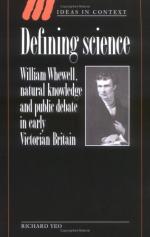|
This section contains 1,319 words (approx. 5 pages at 300 words per page) |

|
William Whewell, the British philosopher and historian of science, was born in Lancaster. He spent the greater part of his life at Trinity College, Cambridge, as an undergraduate, fellow, and tutor, and finally as master of Trinity from 1841 until his death. He twice served as vice chancellor of Cambridge University, and he also taught mineralogy and later (1838–1855) moral philosophy.
Whewell's output was exceptional both in its abundance and in its diversity. Save for a dozen papers on the tides (1833–1850), however, his scientific works were devoted not so much to research as to teaching (Mechanical Euclid, Cambridge, U.K., 1837) or popularization and to apologetics (Astronomy and General Physics, London, 1833; Plurality of Worlds, London, 1853). In addition to his scientific writings he published a number of works in moral philosophy (Elements of Morality, Including Polity, 2 vols., London, 1845; Lectures on Systematic Morality, London, 1846; Lectures on the History of...
|
This section contains 1,319 words (approx. 5 pages at 300 words per page) |

|


